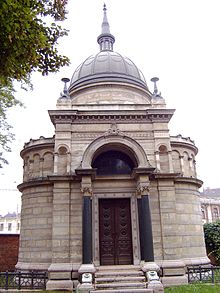Ábrahám Quite
Ábrahám Ganz (born November 6, 1814 or November 24, 1815 in Unter-Embrach , Switzerland ; † December 15, 1867 in Pest , Austria-Hungary ) was a large industrialist who came from Switzerland and grew up there and worked in Hungary in the then Austrian Empire .
Life
Abraham Ganz was born as the son of Protestant Reformed parents in his town of Embrach in the canton of Zurich . His father Johann Ulrich Ganz was a teacher. Abraham Ganz first learned the carpentry trade , then the foundry trade at Escher, Wyss & Cie. in Zurich. He came to Pest as a trader in 1841 and worked there as a mechanic building the Széchenyi steam mill. In 1844 he already had his own foundry in Buda , which quickly developed into an important factory under the name Ganz & Cie . He specialized in the casting of wheels for railroad cars and submitted many patent applications here . He founded holdings in mechanical engineering, electrical engineering and automobile manufacturing companies. Ganz became world famous for his inventions and technical solutions. During the War of Independence in 1848 , his plants produced cast parts for rifles and cannons . (John Burn had received patent no. 3601 in 1812 for his crust-foundry process for the manufacture of chilled cast iron rolls . This process had been used in the USA since the 1850s.) After the end of the war, Ganz tried the invention of the Englishman Burns for casting Developed cartwheels and patented his own solution in 1855. Many of his successes were based on this patent. The company Ganz & Co. also participated in the construction of ships in the port of Fiume, Rijeka (today the 3rd May shipyard ). In 1865, Emperor Franz Joseph I personally expressed his highest appreciation for Ganz. Two years later the hundred thousandth wheel casting was celebrated, three weeks later Ganz died under tragic circumstances; According to some sources, he committed suicide. During his life, Ganz spent considerable sums on the welfare of his workers and on pensions in the event of incapacity for work.
After his death, his close colleague and friend András Mechwart continued the company. Under his leadership, Ganz became one of the most famous companies in Austria-Hungary after 1869.
Production in the original ironworks continued until 1964 when this part of the company was closed and converted into a museum . The so-called Öntödei Múzeum in this same historical building still exists today.
The plants he built today consist of various corporate groups, e. B. the Ganz Brückenbau and Ganz Transelectro . But independent companies such as Leobersdorfer Maschinenfabrik also exist outside the group .
literature
- All of Abraham. In: Austrian Biographical Lexicon 1815–1950 (ÖBL). Volume 1, Verlag der Österreichischen Akademie der Wissenschaften, Vienna 1957, p. 402.
- Franz Maria Feldhaus : Quite, Abraham . In: Allgemeine Deutsche Biographie (ADB). Volume 49, Duncker & Humblot, Leipzig 1904, pp. 676-678. Feldhaus, Franz Maria
- Hans Schmidt: Quite, Abraham. In: New German Biography (NDB). Volume 6, Duncker & Humblot, Berlin 1964, ISBN 3-428-00187-7 , p. 68 ( digitized version ).
- Ganz Abraham in "Schweizer Pioneers der Wirtschaft und Technik", Volume 25, Pages 8-44; published by the Association for Economic Studies, Zurich 1971
- All of Abraham in "Geschichte der Gemeinde Embrach", Volume 2, Pages 164ff; Embrach 1999
- Foundry Abraham Ganz in "IndustrieArchäologie" issue 2, 2011, pages 9–16, publisher and editorial office IndustrieArchäologie. Oskar Baldinger Aarestrasse 83. CH-5222 Umiken
Web links
- Ueli Müller: Quite, Abraham. In: Historical Lexicon of Switzerland .
- Biography (English)
Individual evidence
- ↑ Born on November 6, 1814 according to NDB and HLS , on November 24, 1815 according to ADB and ÖBL .
| personal data | |
|---|---|
| SURNAME | Quite, Ábrahám |
| BRIEF DESCRIPTION | Hungarian industrialist |
| DATE OF BIRTH | November 6, 1814 or November 24, 1815 |
| PLACE OF BIRTH | Unter-Embrach , Switzerland |
| DATE OF DEATH | December 15, 1867 |
| Place of death | Plague (city) |

